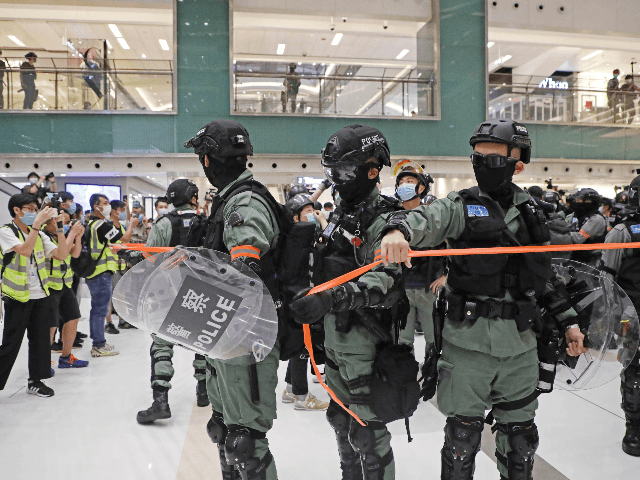Online chatter urging pro-democracy protests in Hong Kong on Friday turned chaotic at Sha Tin’s New Town Plaza, where police attacked protesters with pepper spray and forced them out of the facility for merely singing and chanting anti-government slogans.
Hong Kong is approaching a year since the beginning of a mass anti-communist movement demanding autonomy from China and the civil rights promised to its people after its handover from the United Kingdom. Since the beginning of the current Chinese coronavirus pandemic, protests have diminished significantly as people quarantine and avoid large crowds to keep from spreading the virus. With the number of new cases dwindling and a new series of attacks on prominent members of the protest movement, however, Hong Kongers have become vocal once again in demanding their rights.
The latest iteration of the Hong Kong protest movement has become the “sing with you” protest – an event in which crowds gather in shopping malls and keep their distance, to prevent the spread of the virus, but join in singing pro-democracy songs. A “sing with you” protest last weekend attracted hundreds and triggered large numbers of riot police shutting down the event.
On Friday, a similar event in Sha Tin ended when riot police attacked singers and chanters with pepper spray. The Hong Kong broadcaster RTHK reported that police had flooded the mall half an hour before the protest began, at 7 p.m. local time.
“Some people inside were already chanting anti-government slogans, and the police were on the receiving end of various insults,” RTHK reported, leading to a tear gas attack. “There were scuffles when officers confronted some of the crowd and set up various cordon lines. Journalists were caught up in the commotion when the pepper spray was fired.”
RTHK reported that journalists were arrested as well as protesters.
The Hong Kong Free Press (HKFP) published several videos of the scuffle, which show a large number of people chanting anti-government slogans and insulting police officers, but no physical violence until police began pepper-spraying those in the mall. The protesters largely appear to be wearing sanitary masks despite the fact that it is illegal to wear a mask and participate in a protest in Hong Kong, even amid the Chinese coronavirus pandemic.
Among the pro-democracy chants and protesters heard were the song Glory to Hong Kong, which has become a de facto anthem for the movement, and the slogan “five demands, not one less,” which was born of the original purpose of the protest movement. Last June, protesters began organizing against a law that would have allowed the extradition of anyone present in Hong Kong if accused of violating China’s repressive communist legal code, effectively making Chinese laws – such as the ban on non-government religion or extreme free speech limitations – applicable in Hong Kong. Withdrawal of the proposed law was one of the five demands and the only one the government granted. The other four were the release of political prisoners, an investigation into police brutality, universal suffrage, and an end to calling the peaceful protests “riots.”
Supporters of democracy in the city posted several notices online calling for large rallies on Friday, a communist holiday known as International Workers’ Day. In response, authorities unleashed an army of 3,000 riot police throughout the city to repress any attempt at an assembly. Outside of the Sha Tin protest, however, the riot police were largely left the streets to themselves. RTHK noted in a report that many commenting online believed that the calls to organize on Friday were not from legitimate protest supporters, but from undercover police officers looking to arrest them, so they chose not to heed the invitations.
In one of the few exceptions, Hong Kong protest movement organizer Joshua Wong joined three other members of Hong Kong unions in an attempt to explain the protest movement and labor groups aiding it to the general public. Hong Kong has banned gatherings of more than four people in public as a precaution against the Chinese virus. According to Wong, a swarm of 50 armed police officers surrounded the booth they had built up outside and forced them to disband, claiming the four of them had violated the law banning public groupings of more than four people.
Police announced that it had fined 357 people for violating the “more than four” rule on Friday and begun prosecuting 14 people.
Protest activity has increased partly in response to the mass arrests of some of the movement’s most prominent senior supporters. In late March, a police raid resulted in the arrests of over a dozen figures such as 81-year-old Martin Lee, the founder of the city’s Democratic Party, and 71-year-old Jimmy Lai, the owner of the pro-democracy newspaper Apple Daily. Despite a large number of those involved in the protest movement being young, police appeared to target older and more established anti-China voices, none with any material history of posing a violent threat to the city. The arrests were allegedly a response to them participating in protests last year.
The protests are also occurring in greater number as Hong Kong continues to record good news regarding the spread of the Chinese coronavirus. On Friday, Hong Kong health officials announced they had confirmed two cases of the first, the first two in five days. Two other cases were recorded on the Saturday before.

COMMENTS
Please let us know if you're having issues with commenting.